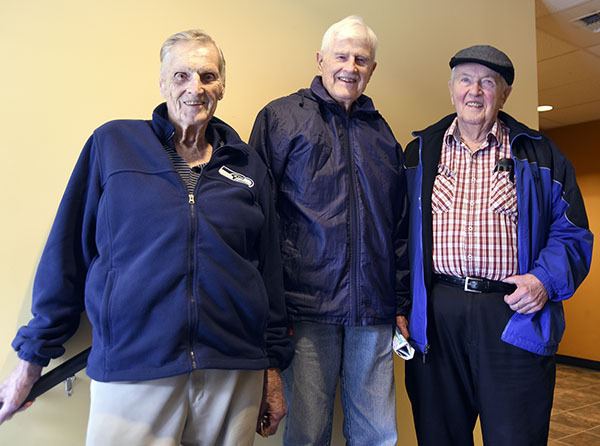When pilot Nick Fischer was young, jet engines hadn’t been invented yet. When he was very young, the town of Snoqualmie Falls still existed — it’s where he was born, actually. Today, at age 94, Fischer jokes that he hasn’t been around long enough to have any history, yet.
“I’m not old enough,” he says, but his story is pretty simple. He was a Navy pilot during World War II, flying PBY and PBM sea planes, and when his term of service was done, he said “I got out, because I was in love with a girl.”
He married the girl, Betty Forster, had six children with her, and spent his whole life, “94 years so far,” in the Puget Sound area.
Fischer visited Snoqualmie last week with several other Navy pilots, among them Johnny Oberto and Bill Anderson, who flew combat and surveillance missions during World War II, and Tony Jurcan and Bob Wells, who flew for the Navy during the Korean war.
“Tony built a seaplane, so I thought I’d bring him some test pilots to give him some advice,” said Wells, who arranged for the meeting at Sno Falls Brewery in Snoqualmie after the group had inspected Jurcan’s plane in Sammamish.
Both Anderson and Oberto, age 93, worked as test pilots, putting new aircraft including SB2C dive bombers, F45 Wildcats, F65 Hellcats, F75 Tigercats, F85 Bearcats and F4U Corsairs through their paces before the Navy would accept them.
“Sometimes they had a few problems, but I never had a flame-out,” Anderson said proudly.
The lifelong pilot — he was a flight instructor in high school, too young to enlist after Pearl Harbor but that didn’t stop him from trying — may be using a different definition for problem, though. Big or small, life-threatening or not, most incidents were just “problems.”
Not all, though.
“If the engine stops, you have a problem,” he said, laughing. “If it catches fire, you now have a major problem.”
Oberto agreed, then launched into a series of stories about the problems he’s encountered in the air.
“The airplanes talk to you,” he explained.
Sometimes the planes communicated with electronic malfunctions, sometimes with stuck landing gear and at least once, he recounted, with a fuel leak spraying the windshield.
And sometimes, rarely, the pilots caused the problems. Oberto remembered flying a Corsair, which didn’t have a full floor in the cockpit, just bars for the pilot’s feet.
“If you dropped your map, it would go to the bottom of the fuselage, and you had to roll it over to get your map back,” he said, with mock exasperation, “because youhad to have your map.”
After the laughter subsided, Fischer asked, “That’s why you guys have got grey hair, isn’t it?”
And after that round of laughter, the group began the process of heading out to their respective homes, Anderson to Shoreline, Oberto to Redmond and Fischer to Issaquah.
Although the three men never knew each other during the war, they met at a series of pilot programs organized by Wells for the Historic Flight Foundation,http://historicflight.org/hf.
Wells hopes to bring the historic aviators together for similar events.



